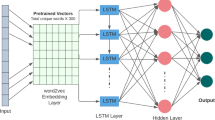Abstract
Deception detection is a vital research problem studied by fields as diverse as psychology, forensic science, sociology. With cooperation with National Investigation Bureau, we have 496 transcript files, each of which contains a conversation of an interrogator and a subject of a real-world polygraph test during interrogation. Researchers have explored the possibility of natural language process techniques in gaming, news articles, interviews, and criminal narratives. In this paper, we explore the effect of the frontier natural language process technique to detect deceptiveness in these conversations. We regard this task as a binary classification problem. We utilize four different methods, inclusive of part-of-speech extraction, one-hot-encoding, means of embedding vectors, and BERT pre-trained model, to capture hidden information of transcript files into vectors. After that, we take these vectors as training samples of a hierarchy neural network, which is constructed by a fully-connected layer and/or an LSTM layer. After training, our system can take a transcript file as its input and classify whether the subject is deceptive or not. An F1 score 0.733 is achieved from our system.
Access this chapter
Tax calculation will be finalised at checkout
Purchases are for personal use only
Similar content being viewed by others
References
Ma, W.-Y., Chen, K.-J.: Introduction to CKIP Chinese word segmentation system for the first international Chinese word segmentation bakeoff, pp. 168–171. Association for Computational Linguistics (2003)
Devlin, J., Chang, M.-W., Lee, K., Toutanova, K.: BERT: pre-training of deep bidirectional transformers for language understanding. arXiv preprint arXiv:1810.04805 (2018)
Hochreiter, S., Schmidhuber, J.: Long short-term memory. Neural Comput. 9(8), 1735–1780 (1997)
DePaulo, B.M., Lindsay, J.J., Malone, B.E., Muhlenbruck, L., Charlton, K., Cooper, H.: Cues to deception. Psychol. Bull. 129(1), 74 (2003)
Vrij, A.: Detecting Lies and Deceit: The Psychology of Lying and Implications for Professional Practice. Wiley Series on the Psychology of Crime, Policing and Law (2000)
Azaria, A., Richardson, A., Kraus, S.: An agent for deception detection in discussion based environments. In: Proceedings of the 18th ACM Conference on Computer Supported Cooperative Work and Social Computing, pp. 218–227 (2015)
de Ruiter, B., Kachergis, G.: The mafiascum dataset: a large text corpus for deception detection. arXiv preprint arXiv:1811.07851 (2018)
Pisarevskaya, D.: Deception detection in news reports in the Russian language: Lexics and discourse. In: Proceedings of the 2017 EMNLP Workshop: Natural Language Processing Meets Journalism, pp. 74–79 (2017)
Levitan, S.I., Maredia, A., Hirschberg, J.: Linguistic cues to deception and perceived deception in interview dialogues. In: Proceedings of the 2018 Conference of the North American Chapter of the Association for Computational Linguistics: Human Language Technologies, Volume 1 (Long Papers), pp. 1941–1950 (2018)
Bachenko, J., Fitzpatrick, E., Schonwetter, M.: Verification and implementation of language-based deception indicators in civil and criminal narratives. In: Proceedings of the 22nd International Conference on Computational Linguistics, vol. 1, pp. 41–48. Association for Computational Linguistics (2008)
Zeiler, M.D.: ADADELTA: an adaptive learning rate method. CoRRabs/1212.5701 (2012). http://arxiv.org/abs/1212.5701
Kingma, D.P., Ba, J.: Adam: a method for stochastic optimization. CoRR abs/1412.6980 (2014). http://arxiv.org/abs/1412.6980
Hinton, G.: Neural Networks for Machine Learning - Lecture 6a - Overview of Mini-Batch Gradient Descent (2012)
Qian, N.: On the momentum term in gradient descent learning algorithms. Neural Netw. 12(1), 145–151 (1999)
Srivastava, N., Hinton, G., Krizhevsky, A., Sutskever, I., Salakhutdinov, R.: Dropout: a simple way to prevent neural networks from overfitting. J. Mach. Learn. Res. 15, 1929–1958 (2014)
Author information
Authors and Affiliations
Corresponding author
Editor information
Editors and Affiliations
Rights and permissions
Copyright information
© 2020 Springer Nature Switzerland AG
About this paper
Cite this paper
Kao, YY., Chen, PH., Tzeng, CC., Chen, ZY., Shmueli, B., Ku, LW. (2020). Detecting Deceptive Language in Crime Interrogation. In: Nah, FH., Siau, K. (eds) HCI in Business, Government and Organizations. HCII 2020. Lecture Notes in Computer Science(), vol 12204. Springer, Cham. https://doi.org/10.1007/978-3-030-50341-3_7
Download citation
DOI: https://doi.org/10.1007/978-3-030-50341-3_7
Published:
Publisher Name: Springer, Cham
Print ISBN: 978-3-030-50340-6
Online ISBN: 978-3-030-50341-3
eBook Packages: Computer ScienceComputer Science (R0)




